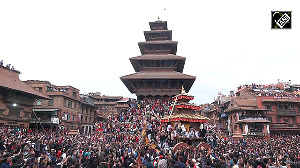What is the measure of a man? Every person is the centre of a web of relationships and these change over time. A relationship with a friend, for instance, is different in school days than it is twenty years later. New relationships are contracted; old ones fade.
What is the measure of Bansi Dhar? Sieving through more than five decades of memories of his relations with me, one sees him as very tall.
Living in a large joint family, where many responsibilities inevitably get shared, owing to a large age gap between Bansi Dhar and the rest of his cousins, some parental responsibilities were naturally assumed by him. We all remember well his loving care for the youngsters.
Whether they were holiday outings, the Sunday morning idlis and dosas at Madras Café, taking of family movies/stills, the mysteries of his photo development dark room or even disciplining us, his care, while not effusive, was just all enveloping.
Remarkably he took a "quiet" joy in participating in every activity of the family. I cannot remember him ever really saying no to any impatient demand by any of the youngsters, be it a ride in his car, ice creams at India Gate, badminton in the evenings, or any other increasingly time and attention consuming matters.
Festival times were the funniest. At Diwali, all the youngsters would be herded to Old Delhi to buy fireworks, and then bursting them with family and close friends with lots of cheer and laughter.
Boisterous and riotous Holi is unthinkable without him -- gulal, pichkaris, mithai, thandai, dunking in the swimming pool (in the old days, when we lived in style!) and the house always full of friends. His friends are all still there. Bengali market roadside chaat, Raksha Bandhan, so many family weddings and other family functions, he was quietly, always a factor in the joy, always the quintessential "family" man. In sickness and in health, in good times and not such good times you could rely on him.
One remembers with great happiness the train to Allahabad of his baraat party. His new bride, Urmila, enthusiastically fitted into our joint family and they soon grew their own family. The first was Tilak and who was the cutest baby in the world and immediately dubbed fatty.
We could have "parented" his children like he parented us, but we went to different schools, grew older with new and different experiences, new responsibilities, new relationships of our own and thus we changed; Bansi Dhar remained steadfast always calm, always cool, always considerate and self effacing, always there.
From morning to night he was always busy "working". We, who lived hedonistically, confused this with disorganisation. Now, looking retrospectively at his "working", it is discovered that he was not only "working" at the business but also in and with so many Associations and Institutions.
At various periods, he became President of the Phd Chamber, Isma, Ficci and others. The Shriram Institute for Industrial Research gained international repute aided by him, and the Shriram College of Commerce, Lady Shriram College, various schools and others were all part of his "work" and he helped grow them greater.
What caused him great anguish was the Charat Ram-Bharat Ram spat and the subsequent splitting up of the family businesses. In that process, a whole bunch of relationships carefully, naturally nurtured for more than fifty years were shattered and were not remoulded as he would have preferred. Bansi Dhar relied heavily on his uncles and his brother and now the script was being rewritten.
The split process involved weekly Tuesday meetings of all the cousins in the office for which the food would come from his house; the love in that food had surely something to do with the ultimately orderly nature of the family split.
This was the denouement of the great DCM. An objective analysis would indicate that, while most of the glory went to the elders, he had much to do with DCM's success at various points. More importantly, at the time of the difficulties at DCM, nothing went wrong under his watch.
He saw the shenanigans of his younger 'family', often was amused or frustrated by them, would tease them about their ups and downs but was always there for chatting to. I believe he never really thought about money per se until the family split, when everybody was talking "money" and what is "mine" and what is "thine".
Post the family split, family members started viewing each other in a different light, in a curious kind of competitive attitude. My own feeling is that he never thought about other people's success or failure. He felt happy when things went well.
The cultured world in which he grew up, the only world he truly felt comfortable in, was vanishing like the mist in a warm sun.
After Urmila's untimely demise he married Suman. The young children needed mothering and Bansi Dhar needed a good lady by his side. Such transitions are always difficult with everybody expecting too much, but he and Suman successfully navigated them with him standing by her patient and solid. She of course has proven to be a gem of great serenity. Suman adjusted and cared for all, and very selflessly, cared for her husband till the very end.
Very regrettably, this self disciplined man with moderate habits developed cancer and much of his stomach and related organs had to be removed. Few thought that he would survive for long. Yet his karma and his courage, and the caring for him, kept him in reasonable health for about 10 years.
Then, in a freak accident he broke his thigh bone which caused him to be laid up for several weeks. I believe that this forced inaction caused his system to start packing up. Like dominoes one complication led to another and then, the inevitable occurred.
And now we must contemplate/meditate on how he stacks up. How does my brother, whom I never loved so much as when he is gone, measure up? Unheralded by media, no great business "star", no flamboyance, no huge bank account --- only his spiritual karmic account spilling over, he stands tall, very tall and is a true hero. A gentleman till the very end.
How do I know? Ask the people -- friends, associates, family, others -- who had anything to do with him in his 74 short years.
(Bansi Dhar, who steered the DCM Group till 1990, and later became the chief managing director of Shriram Industries after the DCM conglomerate split, passed away at the age of 74, on June 26, after a 10-year battle with cancer.)
- Siddharth Shriram is chairman and managing director, Siel.






 © 2025
© 2025